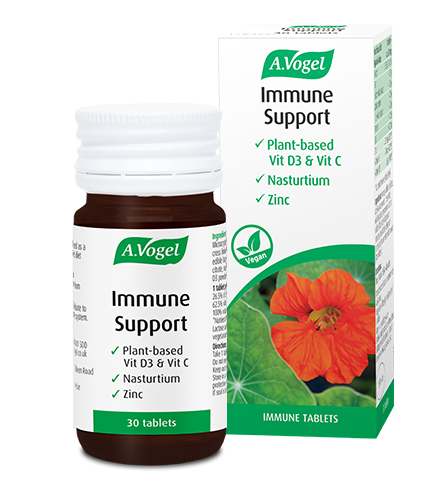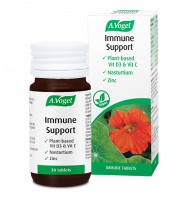Today's topic
Today on A.Vogel Talks Menopause, I'm going to be talking about four unexpected physical symptoms that can occur in the menopause.
We're all aware of the really common physical symptoms that happen in the menopause, such as hot flushes or night sweats, vaginal dryness or aches and pains. But some symptoms can be surprising and unexpected, and very often, they're not commonly associated with the menopause.
Some unexpected physical symptoms you might experience

So today, what I thought I would do is go through four of these unexpected symptoms, explaining why they happen and what you can do to help yourself:
1. Worsening or new allergies
It's quite interesting because, in every hayfever season, we get a lot of menopausal women who find that they've got hayfever for the first time, and are wondering what on earth is going on.
The cause here, generally, is just the fact that the menopause drains us of energy, it puts tremendous pressure on us physically, and combined with low oestrogen, this can weaken our immune function which makes us more vulnerable to all the potential allergens that are out there.
And, obviously, hayfever, because it's quite an extended season and you're being bombarded every day, sometimes the immune system just basically gives way, and you end up with hayfever.
It can also be other allergies such as you can suddenly become allergic to creams or perfumes that you've used for many years.
You might find your skin starts to get really itchy or that the washing powder that you've been using for years, suddenly, you find that you can't wear clothes that are washed in them anymore.
It can also be due to stress. Stress produces chemicals such as histamine. And histamine can cause itchy skin. It can be part of the whole allergic reaction. So there can be several things that can be the trigger here.
What can help?
The best thing to do is to try and support your immune system generally. So that would be taking supplements such as vitamin C or making sure that you get plenty of fresh vitamin C in your diet.
Make sure you're getting zinc. You can look at the herb echinacea, which is known to help to support immune function, and also, we've got our lovely product Immune Support.
A.Vogel Immune Support Tablets with Vitamin D, Vitamin C and Zinc, 30 tablets
£13.99 (30 tablets) In Stock

Are you Menopausal? Need help with your symptoms? Try our Menopause Symptom Checker.
Answer 3 question to find out if you could be menopausal and get personalised tips and advice straight to your inbox based on your results.
2. Bleeding gums and teeth problems
This is quite a common one. This was one that happened to me, and it was ages before I realised it was connected to the menopause.
There's a couple of things that can happen, either your gums start to get a bit swollen. They start to get very tender, and they bleed every time you brush your teeth. For some women, too, the gums can start to recede, and this can cause problems with your teeth.
If it goes on for too long, your teeth can become loose.
What can help?
A supplement you could look at is one called CoQ10. This is very good for bleeding gums. If you're getting a lot of inflammation, Sea Buckthorn Oil is another one that can be very helpful for the gums.
Make sure you're getting plenty of vitamin C in your diet because low vitamin C can also contribute to bleeding gums and if this happens, then, it's always a good idea to go and see your dentist or hygienist and get some kind of treatment protocol in place.
3. Increase in urinary tract infections
You might find that you get cystitis. Go to the doctor, you get antibiotics. It clears up, and then, the next thing, it comes back again. And this can become a real vicious cycle. We get so many women that just seem to be in this the whole time. They seem to get one infection after the other.
Main causes here is that falling oestrogen will affect the vagina-friendly bacteria. When this happens, these friendly bacteria also police the whole vaginal area and also the opening of the urethra, which is the tube that goes up to the bladder.
So, if you're lacking in these friendly bacteria, you are going to be much more vulnerable to bladder infections.
What can help?
As well as treating any urinary tract infections, it's important to treat the vagina as well. Several things can help if you have cystitis or if you suffer from reoccurring cystitis.
My top tip: How to help ease Cystitis
Watch my self-care video to find out what I recommend for cystitis, including what can help relieve this urinary tract infection, as well as what you should avoid if you have cystitis or get repeated bouts of cystitis:
Our Uva-ursi & Echinacea Cystitis oral drops are used to help relieve minor urinary complaints associated with cystitis in women such as a burning sensation when urinating and frequent urination.
You can also look at Sea Buckthorn Oil as well. This can be another one for helping an inflamed bladder.
As I mention in my video, dehydration will affect the bladder. It can make your urine really strong and acidic. And this can be part of the whole problem. If you're dehydrated all the time, then, your poor bladder is getting irritated. It's going to be continuously inflamed, and that will leave the bladder more vulnerable to these types of infections as well.
So, in this situation, especially when you're getting them frequently or you're in this whole vicious cycle, it's important to treat the whole area, so that's the bladder and the vagina here. And remember the water.
4. Increased libido
For the majority of women, libido tends to decrease. This can be due to so many different factors, such as fatigue, vaginal dryness and you're just not in the mood anymore. But for a small number of women, they get very surprised when their libido increases. This happens, again, for several reasons.
It could just be the way that their particular hormonal balance is going at that particular time.
You can sometimes get an increase in oestrogen in the menopause. Your hormones don't always fall. They can suddenly shoot back up. So, a sudden burst of oestrogen can really stir up your libido.
It can also be because these women are not worried about getting pregnant anymore. There's a sort of freedom of knowing that your childbearing years are over.
It could also be the fact that the children have maybe left home, and the woman and her partner can be on their own for a while.
With this one, the majority of women who've come to me wondering what on earth is going on, it's a happy outcome. So, there's really nothing that you really need to do in this case, except to enjoy it.
So hopefully, this has helped. If any of you have any other symptoms that you're really wondering about, then please, do let us know.
And until next week, take care.



 Looking to support your immune system? Well, look no further!
Looking to support your immune system? Well, look no further!


